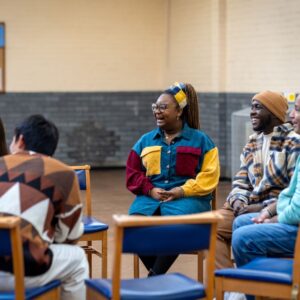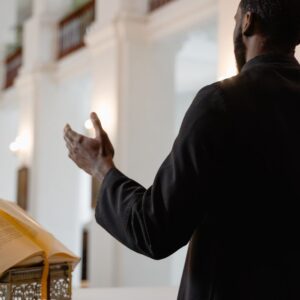Across the Cascadia bioregion – from coastal towns to urban centers and even to digital gathering spaces – something sacred is happening in our midst.
In a culture when Christianity no longer occupies the center square, it would be easy to imagine that preaching and scriptural engagement more broadly would fade into the past. Instead, we’re finding sparks of innovation, courage, and deep spiritual engagement in Christian faith communities across the region.
We want to find more of those sparks. We need your help.
What We’re Seeking
The Center for Transforming Engagement is launching a research project to explore what makes preaching meaningful today.
Our focus is on contexts where church attendance is declining, cultural assumptions about faith are shifting, and certainty is giving way to curiosity and meaningful questions. In other words: We’re focusing on our home region of Cascadia, from northern California through Oregon, Washington, British Columbia, and up to southern Alaska.
We’re looking for faith communities and preachers who are engaging scripture in ways that resonate, challenge, comfort, and transform. This might look like creative sermon formats, new ways of gathering, or simply a renewed approach to what it means to preach in our current cultural moment.
We are especially interested in:
- Congregations or communities where scripture, personal growth, and a sense of belonging are woven together in meaningful ways. These are especially compelling when the community engages in scripture together in ways beyond the traditional behind-a-pulpit sermon format.
- Preachers who are helping their communities engage scripture with honesty, imagination, and depth. These preachers might work in traditional formats or in innovative ones. What we’re interested in is how they spark connections between scripture and congregants’ lives.
We describe this kind of engagement with three themes:
- TEXT – Scripture is not just heard but wrestled with; congregants make sense of their lives through biblical narratives and traditions.
- SOUL – There is felt spiritual growth, especially the capacity to live with complexity, nuance, and mystery.
- CULTURE – People experience belonging that doesn’t depend on conformity, and their engagement with scripture moves them toward greater love, justice, and hope.
If a community preacher you know reflects any part of that description — we’d love to hear about it. They don’t need to be a formal “congregation” or affiliated with a denomination. Perhaps you know a gathering of families who engage scripture over dinner once a month: that would fit.
Why This Matters
In our post-Christendom context, preaching is different. But it’s not disappearing.
Preaching is different from preaching on the East Coast or in the Midwest; the formats, metaphors, expectations of biblical literacy, and culture of church attendance that hold there just aren’t the reality here. It is different from what we were trained in, even if that training was recent, as reality always moves faster than the academy.
In many places, preaching is becoming more grounded, more participatory, more imaginative — a way for people to explore their deepest questions, navigate cultural complexity, and stay rooted in hope.
We want to embrace the differences of preaching in post-Christendom contexts, and we want make them visible. Preaching should be culturally located. Using language, symbols, metaphors, and stories that resonate with a culture and make the gospel accessible is a part of the Christian tradition. Preaching has always been evolving.
We believe there’s much to learn from these communities and voices. By collecting and sharing their stories, we hope to equip and inspire others who are navigating similar terrain with best practices for contextually adaptive sermons and a new imagination for formats of scriptural engagement.
What Happens After Nomination
Nominees will be reviewed by our research team via their online presence and sermons, if available. Some will be contacted for a conversation to learn more.
Of these, select communities will be visited in person, and with their consent, we’ll share what we learn — highlighting best practices, creative formats, and the quiet brilliance of spiritual leadership and followership that too often remains out of sight.
Help Us Find the Sparks
Do you know a preacher or Christian faith community doing something remarkable with scripture? We are interested in them even if they go beyond typical models.
Perhaps the preacher isn’t ordained or trained. Perhaps they would never use the word “preacher” or “pastor” to describe themselves. Perhaps they only preach on rare occasions; perhaps they do so regularly.
Perhaps the communities meet Sunday mornings and are a denominationally affiliated congregation. Perhaps they’re a small group that meets at another time of the week, or less often. Perhaps they’re totally independent, and would never use the word “church” to describe themselves. Maybe they’re big, small, in person, online, or some combination.
If they’re helping people engage scripture in ways that matter — we want to know.










0 Comments